

Act research. Clip Art No More: Stock Photos for Programs and Marketing. Future Libraries And The 17 Forms Of Info Replacing Books. Question: As physical books go away, and computers and smart devices take their place, at what point does a library stop being a library, and start becoming something else?
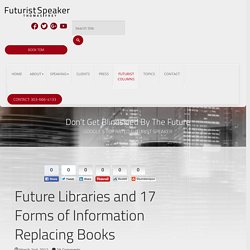
Somewhere in the middle of this question lies the nagging fear and anxiety that we see brimming to the top among library insiders. People who think libraries are going away simply because books are going digital are missing the true tectonic shifts taking place in the world of information. Libraries are not about books. In fact, they were never about books. Libraries exist to give us access to information. Gas Station Maps As a young child, I was enamored with the free maps I could pick up at gas stations. Along with the early days of the automobile and a generally confusing road system came the need for maps. Over time, anyone driving a car soon came to expect free maps whenever they stopped for gas, and companies like Rand McNally, H.M.
Are printed books likely to go through a similar dwindling of popularity? 2010perceptions all. Is Google Making Us Stupid? Illustration by Guy Billout "Dave, stop.
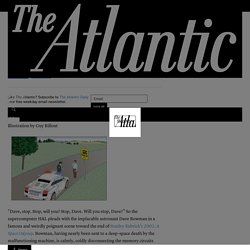
Stop, will you? Stop, Dave. Will you stop, Dave?” So the supercomputer HAL pleads with the implacable astronaut Dave Bowman in a famous and weirdly poignant scene toward the end of Stanley Kubrick’s 2001: A Space Odyssey. I can feel it, too. I think I know what’s going on. For me, as for others, the Net is becoming a universal medium, the conduit for most of the information that flows through my eyes and ears and into my mind. I’m not the only one. Bruce Friedman, who blogs regularly about the use of computers in medicine, also has described how the Internet has altered his mental habits. Anecdotes alone don’t prove much. It is clear that users are not reading online in the traditional sense; indeed there are signs that new forms of “reading” are emerging as users “power browse” horizontally through titles, contents pages and abstracts going for quick wins.
The Freedom to Read Statement. The freedom to read is essential to our democracy.
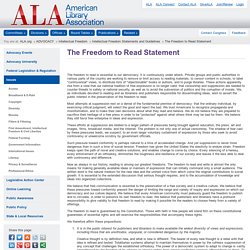
It is continuously under attack. Private groups and public authorities in various parts of the country are working to remove or limit access to reading materials, to censor content in schools, to label "controversial" views, to distribute lists of "objectionable" books or authors, and to purge libraries. The Freedom to Read Statement. Interview: Why Lauren Myracle’s Proud to Top ALA’s List of Most Challenged Books. This week marks the 30th anniversary of Banned Books Week, an annual event that celebrates the Lauren Myracle freedom to read.
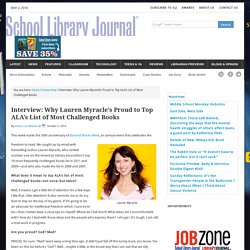
We caught up by email with bestselling author Lauren Myracle, who ranked number one on the American Library Association’s top 10 most frequently challenged books list in 2011 and 2009—and who also made the list in 2008 and 2007. What does it mean to top ALA’s list of most challenged books–not once–but twice? Well, it means I get a little bit of attention for a few days. Not Censorship But Selection.
THERE IS AN AMUSING WORD GAME with which many of you are familiar in which the object is to trace an action, a point of view, or a characteristic through the gamut of its connotations from the most to the least acceptable.
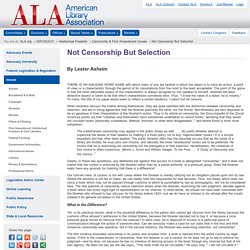
The point of the game is that the most admirable aspect of the characteristic is always assigned by the speaker to himself, whereas the least attractive aspect is taken to be that which characterizes somebody else. School Libraries in Canada Online! Volume 23, Issue 3, 2004 Have you ever had someone walk into your library and say, “What a wonderful collection!
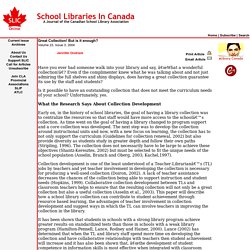
€? Even if the complimenter knew what he was talking about and not just admiring the full shelves and shiny displays, does having a great collection guarantee its use by the staff and students? Is it possible to have an outstanding collection that does not meet the curriculum needs of your school? Unfortunately, yes. A revised manifesto. Thank you all for the kind feedback you offered for my rant a few days back.
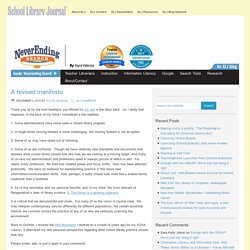
As I wrote that response, in the back of my mind I considered a few realities: 1. Some administrators have never seen a vibrant library program. 2. In tough times moving forward is more challenging. 3. 4. 5. It is critical that we demonstrate and share. Back in October, I revised the little Manifesto I worked on a couple of years ago for my VOYA column.
Please share, add, or pull it apart in your comments. Manifesto for 21st Century School Librarians My prompt: A couple of summers back a young school librarian, fresh out of library school, asked a very honest question at one of our state retreats: We’re all doing different stuff. Well into the 21st century, it is clear that the concept of modern teacher librarian practice is not clear. In the past few years many of us have re-imagined school library for learners using the array of new tools and abilities in front of us today. Reading Information Landscape. A revised manifesto.